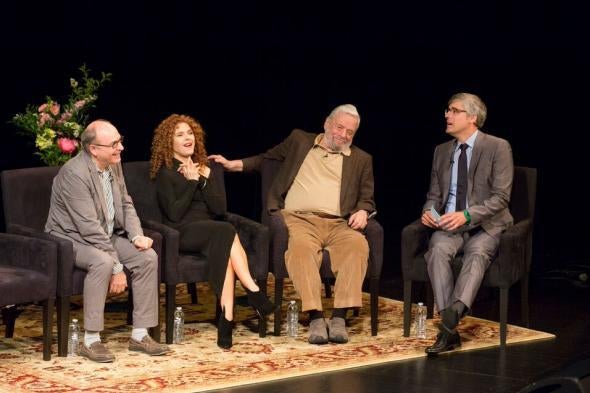Frank Rich closed his cool, equivocally admiring review of the original 1987 Broadway production of Into the Woods with the observation that it “may be just the tempting, unthreatening show to lead new audiences to an artist who usually lures theatergoers far deeper, and far more dangerously, into the woods.” What Rich couldn’t foresee is that this nervy, brittle fairy-tale mashup from Stephen Sondheim and James Lapine would become more than a gateway drug to Company or Sweeney Todd—that instead, for a generation of a particular kind of wised-up culture aficionado, Into the Woods has become the definitive Sondheim masterwork, Wicked for smart people.
It makes sense that the show’s appeal extends well beyond show queens. In an era of superhero reboots and revisionist fairy tales, Into the Woods towers as a sort of pop-culture monument. Though much of its irreverent riffing on the tales of Cinderella, Red Riding Hood, and Jack and the Beanstalk now seems relatively tame, the ingenuity of Lapine’s intricately braided script, matched in its patchwork brilliance by Sondheim’s spiky score, have well earned the show’s canonical status, even among those—like myself, I’ll admit—who share Rich’s more arm’s-length admiration. (It should be added that last year’s hit film adaptation made me appreciate the original’s special, if circumscribed, genius all the more.)
“How many of you love Into the Woods?” emcee Mo Rocca asked a full house at Brooklyn Academy of Music’s Opera House on Sunday, where a partial original-cast reunion revisited the show in song and conversation. The crowd responded with the first of many thunderous sports-arena cheers. Rocca, who bobbed his head like a superfan along with the songs from the stage, made a pert revival-meeting host, peppering Lapine and Sondheim with questions about the show’s creation (it began as a hybrid of two Lapine projects, one an attempt to create an original fairy tale, the other a mashup in which characters from iconic 1950s TV shows collided at a hospital), and eliciting a mix of spontaneous and prefab backstage tales from the cast. These ranged from boilerplate how-I-got-the-part tales to a detailed recounting of the evolution of the Wolf’s costume, which was at first distractingly anatomically correct. “The word is ‘pendulous,’” said Robert Westenberg, who played the Wolf as well as Cinderella’s prince, and who endured successive nightly prunings until the wolfen member was closer to a codpiece than a sex toy.
The original production ran for nearly two years on Broadway, long enough for the cast to form a stronger-than-usual show family, and many have repeated their roles (or other roles in the same show) often since. Their affinity for each other and the material still shows, in other words, as seen in the still warm-but-tetchy banter of the original Baker and Baker’s Wife, Chip Zien and Joanna Gleason, or the friendly joshing of Ben Wright, the original giant-killing Jack, and Danielle Ferland, the original Little Red Riding Hood. But apart from Bernadette Peters, none of the Into the Woods actors are stars, and in fact a sobering number don’t perform full-time anymore: Westenberg leads the theatre department at Drury University in Springfield, Missouri, while Wright works as a financial advisor.
You wouldn’t know it from how great they all still sound, 28 years later; Wright made “Giants in the Sky” a particular highlight, as did Kim Crosby, the original Cinderella, with an “On the Steps of the Palace” that landed as well or better than ever. And if I were a Broadway producer who saw how well the ageless Peters can rock the Witch’s numbers all these years later, I’d seriously consider persuading her to take another lap around the track in a new revival.
Indeed, the event suggested a sunnier version of another Sondheim show, Follies, recently revived with Peters, in which a troupe of Ziegfield Follies girls, deep into the compromises of middle age, reunite and revisit the roads not taken. In this case, though, the show’s fairy-tale glow doesn’t seem to have faded for its surviving actors: All save Peters are now parents themselves, which they said only deepens their connection to the show’s child-rearing themes. Crosby and her prince, Westenberg, even got hitched after the show and are still happily-ever aftering in Missouri.
As for Sondheim: Standing ovations at his mere public appearance are by now de rigeuer, and the now 85-year-old composer, while hardly milking it, doesn’t seem to have tired of the adulation. Indeed, among the most moving sights of the evening was the spectacle of the composer/lyricist, now grizzled and grandfatherly but alert as ever, gazing out at the audience as they eagerly received his work, yet again, with a fervor it wouldn’t be wrong to call religious. When Gleason called him “Zeus” at one point, Sondheim merely smiled back, a little flushed; there’s something tender and humbling about this prolix genius rendered speechless by acclaim.
But he’s still no slouch with a comeback. Rocca wanted to know if there’d ever been pressure, particularly for the Disney film version, to “make the material more upbeat.” To which Sondheim replied, “I think it’s very upbeat.”
Correction, June 23, 2014: The caption of the above photo originally misidentified Mo Rocca as Richard Termine.
